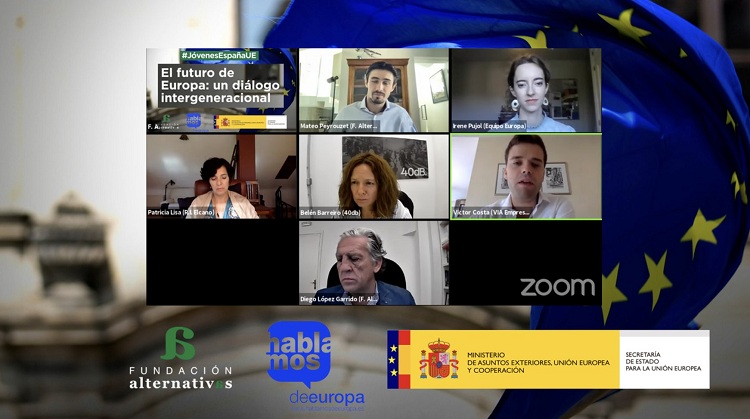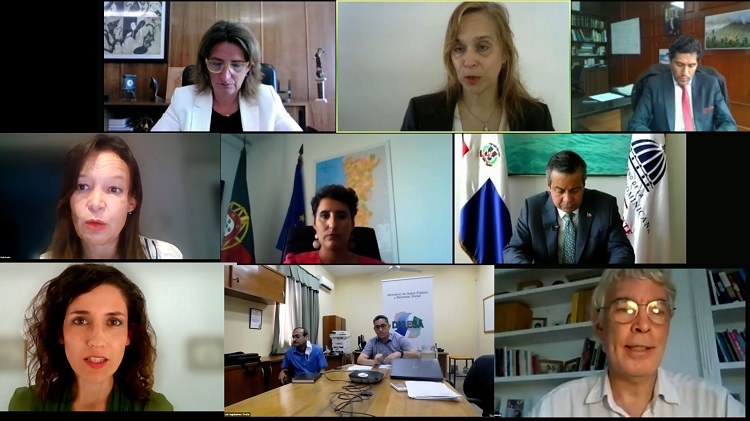The Diplomat
Seven out of ten young Spaniards between 128 and 35 years old feel pro-European, according to a study made public this week by the Fundación Alternativas.
“Young people recognize the meaning of the EU and value some of its actions,” said Belén Barreira, the director of the company 40dB, during the telematic colloquium The future of Europe: an intergenerational dialogue, which took place last Tuesday and served as a presentation of the study. The event was presented and moderated by Mateo Peyrouzet, coordinator of the Foreign Policy Observatory of the Fundación Alternativas.
The survey, conducted by 40dB among Spaniards between 18 and 35 years old, has been published by the Fundación Alternativas in the dual framework of the initiative Hablamos de Europa of the Secretary of State for the European Union and the Conference on the Future of Europe, launched by the Commission and which will conclude in the spring of 2022.
According to the survey, 66% of young Spaniards declare themselves to be pro-European, which would indicate that “the era of despair among young people towards the Union is coming to an end,” Barreiro continued. All the participants in the colloquium (belonging to different generations) agreed that there has been a shift from the pessimism and mistrust surrounding the management of the 2008 financial crisis, especially on the part of the young population, to the greater confidence in the European project resulting from the management of the crisis caused by COVID-19 in 2020, as indicated by the results of the latest Eurobarometer.
However, Victor Costa, director of the digital media VIA Empresa, warned during the colloquium that the solidarity shown in the current crisis by the Member States cannot simply be a way of saving the EU, but must last over time, because “the European Union must be built between all generations and all countries”. In this sense, she recalled that the survey shows that most young people believe that the most benefited by the European institutions in this crisis have been the big companies, which does not contribute “to end inequality or to improve the image of the Union by its citizens”.
For all these reasons, according to Patricia Lisa, an analyst at the Elcano Royal Institute, one of the challenges for the Union is to prevent the States from monopolizing the optimism injected by European aid, which is why the European institutions should carry out communication work and focus on rebuilding a “social Europe”. “All citizens have seen the need and the advantage of being in Europe, this is valued in the polls,” she said. “Now, however, having overcome the immediate needs of the crisis, no one guarantees that the spirit of solidarity will be maintained”, which is why it is necessary to encourage more debate among citizens, so that they have “a voice”, and to connect more “the social pillar” with this debate on the future of Europe,
Among the proposals presented during the debate, Diego López Garrido, executive vice-president of Fundación Alternativas, insisted on the need for a “fiscal union that makes solidarity between member states permanent”. “We are in a moment of recovery and a certain optimism. However, in my opinion there is one thing that has not been done and that is social Europe, an enormous source of legitimacy,” he declared.
For her part, Irene Pujol, a volunteer in the European Parliament and co-founder of Team Europe, proposed that the Parliament be given more weight as a body to unblock decisions when they are paralyzed in the Council and defended the need to move towards greater integration in fiscal, health, foreign and migratory policy. “We can be positive: Europe’s legitimacy is on the rise,” although “we are still facing a multidimensional crisis where the EU has to ask itself many questions about its own role in the world and its domestic functioning,” she added.







